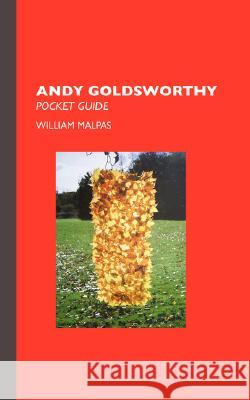Andy Goldsworthy » książka
Andy Goldsworthy
ISBN-13: 9781861712417 / Angielski / Miękka / 2008 / 244 str.
ANDY GOLDSWORTHY: POCKET GUIDE
A pocket-sized guide to the art of Andy Goldsworthy, Britian s foremost sculptor of the natural world. This book tells you everything you need to know about Andy Goldsworthy and his artworks. EXTRACT FROM CHAPTER 5
Andy Goldsworthy works with the natural world, and within nature. He uses natural materials in natural shapes and forms set in natural contexts. Goldsworthy takes his cue from nature: as Jan Dibbets put it in 1969: I realized that if you want to use nature, you have to derive the appropriate structure from nature too . Nature may be the starting-point but, as we ll see, the endpoint art is entirely cultural and not something you ll ever find in the natural world.
Andy Goldsworthy seems to be a particularly gentle and sensitive artist, compared to many sculptors and land artists: he stitches together leaves to form lines (which re often placed in water, or over branches), or makes circular slabs of snow, or entwines twigs in an arc. He creates a delicate spiral of chestnut leaves, called Autumn Horn (1986); he pins bright yellow dandelions on willowherb stalks in a circle, on bluebells (1987); he makes lines and cairns of pebbles; a horizontal line of red sumach leaves was pinned to a willow (at Storm King Art Center in 1998); he rubs red stones to stain rockpools; he pins leaves to tree trunks; he fashions a zigzag line of hogweed stalks along a fallen elm tree (2002); he makes hollow, circular structures, recalling igloos, from slate, leaves, driftwood and bracken; he creates long wavy ridges in Arizonan and Australian desert sand; he throws sand and sticks in the air and photographs the moment; he builds arches, globes, hollow spheres, slabs, spires, spirals and star-shapes out of snow and ice. Very impressive it all is. The sculptures made of sticks, for instance, stuck together in an arch, or a line, reflected in the mirror-like water of Derwent Water in Cumbria in 1988, are indeed wonderful. The sculptures exude tranquillity, an early morning calm.
AUTHOR BIOGRAPHY
William Malpas has written books on Richard Long and land art, as well as three books on Andy Goldsworthy, including the forthcoming Andy Goldsworthy In America. Malpas s books on Richard Long and Andy Goldsworthy are the only full-length studies of these artists available. "
ANDY GOLDSWORTHY: POCKET GUIDE
A pocket-sized guide to the art of Andy Goldsworthy, Britian’s foremost sculptor of the natural world. This book tells you everything you need to know about Andy Goldsworthy and his artworks.
EXTRACT FROM CHAPTER 5Andy Goldsworthy works with the natural world, and within nature. He uses natural materials in natural shapes and forms set in natural contexts. Goldsworthy takes his cue from nature: as Jan Dibbets put it in 1969: ‘I realized that if you want to use nature, you have to derive the appropriate structure from nature too’. Nature may be the starting-point but, as we’ll see, the endpoint – art – is entirely cultural and not something you’ll ever find in the natural world.
Andy Goldsworthy seems to be a particularly gentle and sensitive artist, compared to many sculptors and land artists: he stitches together leaves to form lines (which’re often placed in water, or over branches), or makes circular slabs of snow, or entwines twigs in an arc. He creates a delicate spiral of chestnut leaves, called Autumn Horn (1986); he pins bright yellow dandelions on willowherb stalks in a circle, on bluebells (1987); he makes lines and cairns of pebbles; a horizontal line of red sumach leaves was pinned to a willow (at Storm King Art Center in 1998); he rubs red stones to stain rockpools; he pins leaves to tree trunks; he fashions a zigzag line of hogweed stalks along a fallen elm tree (2002); he makes hollow, circular structures, recalling igloos, from slate, leaves, driftwood and bracken; he creates long wavy ridges in Arizonan and Australian desert sand; he throws sand and sticks in the air and photographs the moment; he builds arches, globes, hollow spheres, slabs, spires, spirals and star-shapes out of snow and ice. Very impressive it all is. The sculptures made of sticks, for instance, stuck together in an arch, or a line, reflected in the mirror-like water of Derwent Water in Cumbria in 1988, are indeed wonderful. The sculptures exude tranquillity, an early morning calm.
AUTHOR BIOGRAPHY
William Malpas has written books on Richard Long and land art, as well as three books on Andy Goldsworthy, including the forthcoming Andy Goldsworthy In America. Malpas’s books on Richard Long and Andy Goldsworthy are the only full-length studies of these artists available.











